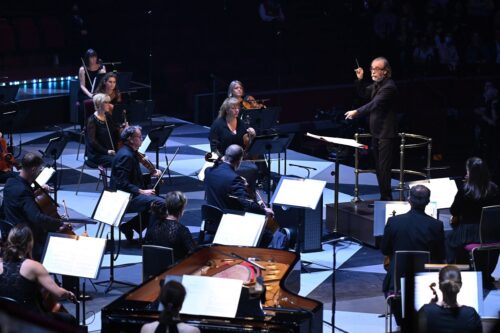
 United Kingdom BBC Proms 2021 [16] – Lewis and Beethoven: Lucy Crowe (soprano), Damon Holzborn (computer software design/realisation), Sound Intermedia, BBC Scottish Symphony Orchestra / Ilan Volkov (conductor). Royal Albert Hall, London, 26.8.2021. (MB)
United Kingdom BBC Proms 2021 [16] – Lewis and Beethoven: Lucy Crowe (soprano), Damon Holzborn (computer software design/realisation), Sound Intermedia, BBC Scottish Symphony Orchestra / Ilan Volkov (conductor). Royal Albert Hall, London, 26.8.2021. (MB)

George Lewis – Minds in Flux (world premiere)
Beethoven – Concert Aria, ‘Ah! perfido’ Op.65; Symphony No.2 in D major Op.36
This year’s Proms premieres — those I have heard, anyway — have been a mixed bunch: professional enough, yet often safe to the point of anodyne, having one long instead for something decidedly ‘new’ from the repertoire, be it Haydn or Ligeti, Machaut or Schoenberg. George Lewis’s Minds in Flux, however, was the real thing: music with something to say, some point to it beyond fulfilling a commission, whether or not that ‘something’, that ‘point’, remains elusive to verbal expression. It was, dare I suggest, an Albert Hall work too, making full use of the notorious space and acoustic, not so as to be enslaved by it, but rather to create new space within and beyond it, by virtue — not unlike Stockhausen — of electronic means. From its opening, electronic sounds surrounding us, woodwind and their electronic shadows, progeny, Doppelgänger echoing across the hall like gulls, reference points proved but the starting point for music both familiar and unfamiliar. A Stravinsky-meets-jazz chorale, a song, a dance, a moment of rage, a moment of consolation: here was a sonic cornucopia always in flux, the product of minds in flux. If Mahler wanted a symphony to contain everything, a whole world, Lewis seemed to say: there are many more worlds; there are silenced voices too in our colonised world. Let us hear them; let us consider them. It was ominously inviting and invitingly ominous. Perhaps it referred, perhaps not; above all, it played and invited us, our minds and bodies, to play. Charles Ives, I fancied, might have understood this strikingly intelligent, strikingly democratic invitation.

Lucy Crowe joined the BBC Scottish Symphony Orchestra and Ilan Volkov for Beethoven’s concert aria, ‘Ah! perfido’. It was an almost equally intense reading, dignified in its post-Mozartian, slightly neoclassical way, alert, like Lewis’s work and the performance we had heard of it, to musical shadows too. Strikingly sincere, Crowe showed us that any doubts we might have to the verse (Metastasian recitative, followed by an anonymous aria text) are our problem, or other performers’, not intrinsic. Well supported and, where appropriate, directed by Volkov, Crowe rightly took her time then, rightly, erupted. Here was Beethoven on a grand scale, with passages of moving intimacy both contrasted with and necessary to that scale.
The Second Symphony followed, in a performance of many virtues, particularly during its second and fourth movements, yet one which never quite addressed that necessary Beethovenian question: what does this mean to us? Again, an answer need not, arguably cannot, be verbal, yet Beethoven’s humanism demands something. The introduction to the first movement was alert and detailed, characterised as elsewhere by fine playing from the BBC SSO. Volkov never quite pinned down a basic pulse, though, with the consequence that it sounded restless rather than expectant, a collection rather than a chain of ideas. The main Allegro con brio was better: occasionally hard-driven, yet essentially permitted to speak for itself and all the better for it. If it lacked inevitability, that was more apparent in the Larghetto, heard also with a keen sense of the music’s sheer loveliness. There was darkness to its heart, too, speaking of and through dialectic necessity. The Scherzo was again driven hard, distant rather than immediate. Its trio was well pointed, if slightly lacking in flow. Volkov captured very well the difficult balance at the onset of the finale between quirky incident and onward propulsion. If it was good natured, it had bite too.
Mark Berry
